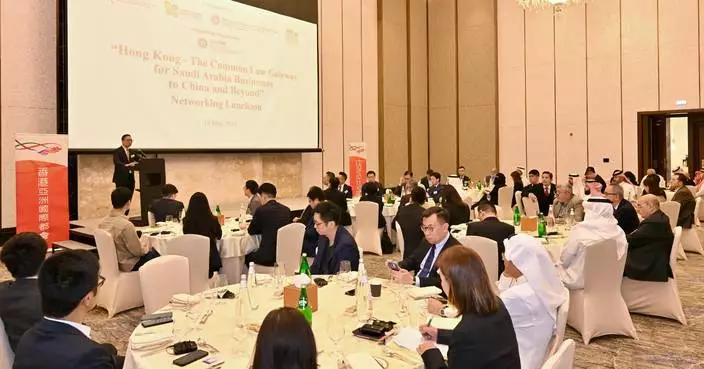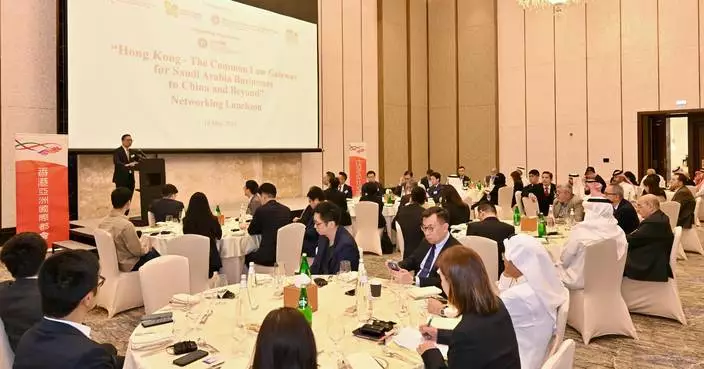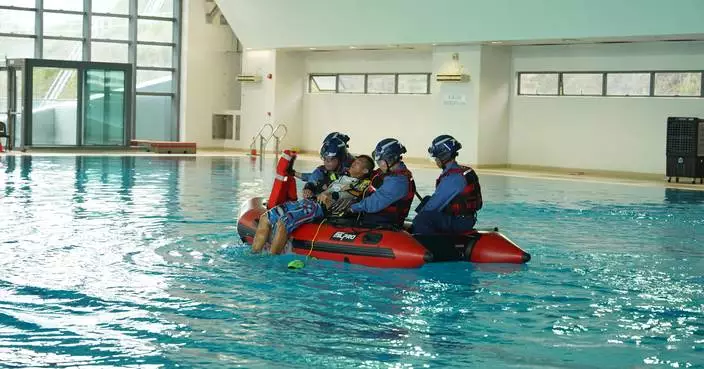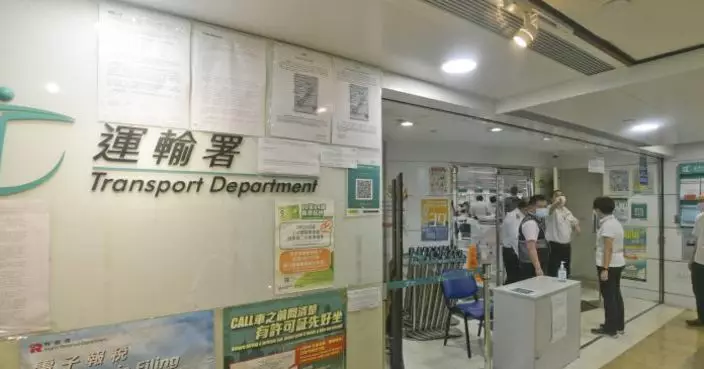Unlocking opportunities: examining the current state of labour importation - lcq18
Following is a question by the Hon Yiu Pak-leung and a written reply by the Secretary for Labour and Welfare, Mr Chris Sun, in the Legislative Council today (May 8):
Question:
The Government successively launched the Labour Importation Scheme for the Transport Sector - Aviation Industry and the Enhanced Supplementary Labour Scheme (ESLS) last year to alleviate the manpower shortage across different sectors. However, members of various sectors have relayed to me that these two schemes, which have been implemented for more than half a year, are not as effective as expected and have failed to help them alleviate the imminent manpower shortage. In this connection, will the Government inform this Council:
(1) of the number of imported workers who have arrived to work in Hong Kong since the implementation of the Labour Importation Scheme for the Transport Sector - Aviation Industry, with a breakdown by the 10 job types under the scheme;
(2) of the respective numbers of applications received and approved by the authorities and the number of workers involved since the implementation of the ESLS, and whether the authorities will compile statistics on/estimate the number of workers who have arrived to work in Hong Kong; of the aforesaid information on the 26 job categories normally excluded from the Supplementary Labour Scheme;
(3) of the respective numbers of applications from the hotel, guesthouse and travel agent industries received, being processed, approved and rejected by the authorities and the job types involved since the implementation of the ESLS; whether the authorities will compile statistics on/estimate the number of workers who have arrived to work in Hong Kong; and
(4) as members of the industry generally consider that the progress of processing applications under the ESLS has been slow, making it difficult to alleviate the imminent frontline manpower constraints facing the industry, and the Government indicated in the reply to a question raised by a Member of this Council on the 10th of last month that new measures will be introduced shortly to further improve the workflow of processing relevant applications, of the anticipated reduction in the average time taken to process each application following the implementation of the new measures?
Reply:
President,
To cope with the challenges brought by manpower shortage, the Government has enhanced the mechanism for importation of workers on the premise of safeguarding the employment priority for local workers. On July 17, 2023, the Transport and Logistics Bureau (TLB) launched the Labour Importation Scheme for the Transport Sector – Aviation Industry (Aviation Scheme). The Labour Department (LD) has also implemented the Enhanced Supplementary Labour Scheme (ESLS) since September 4, 2023 to enhance the coverage and operation of the Supplementary Labour Scheme, including suspending the general exclusion of the 26 job categories as well as unskilled/low-skilled posts from labour importation for two years.
In consultation with the TLB, my reply to the Member's question is as follows:
(i)The Aviation Scheme allows aviation-related companies with direct contractual relationships with the Airport Authority Hong Kong to suitably import workers on the prerequisite of safeguarding the employment priority of local workers, with a quota ceiling of 6 300.
In the first round of application from July to August 2023, the TLB approved the applications from 28 eligible companies with a total of 2841 quotas covering all 10 job types under the Aviation Scheme. As at April 2024, 1450 imported workers had arrived to work in Hong Kong and their distribution with a breakdown by job type is at Annex 1.
The second round of application under the Aviation Scheme was conducted from March to April 2024. The TLB approved the applications from 27 eligible companies with a total of 2 982 quotas also covering all job types. The employers concerned have already started recruiting imported workers and those approved in the second round are expected to arrive to work in Hong Kong starting from June to July 2024.
(2) and (3)From September 4, 2023 to April 30, 2024, 4 239 applications seeking to import 41470 workers were received under the ESLS. Of these applications, 31574 imported workers intended to take up posts which were generally excluded from labour importation before (21662 and 9912 respectively for the 26 job categories and the unskilled/low-skilled posts). During the same period, 1277 applications seeking to import 8 586 imported workers were approved under the ESLS, including 4929 workers approved to take up posts which were generally excluded from labour importation in the past (3910 and 1019 respectively for the 26 job categories and the unskilled/low-skilled posts). A breakdown of the numbers of imported workers applied for and approved by the 26 job categories is at Annex 2.
In addition, apart from the approved applications, as at April 30, 2024, 1 028 applications in respect of those received after the launch of the ESLS had started or completed the local recruitment exercise, seeking to import 11313 workers. The LD expects that the vetting of most of these applications will be completed in the second quarter of this year. The exact number approved will depend on the results of local recruitment and the application details of the cases.
As at April 30, 2024, the major posts related to the accommodation services industry (including the hotel and boarding house sectors) received under the ESLS included room attendant, waiter/waitress and receptionist, etc. A breakdown of the numbers of applications received, under processing, approved and refused relating to the accommodation services industry is at Annex 3. The LD does not maintain a breakdown on the travel agency sector.
Employers approved to import workers under the ESLS are required to sign a standard employment contract with each of its prospective imported worker. They shall arrange their prospective imported workers to submit visa/entry permit applications to the Immigration Department within the period specified in the approval-in-principle letter (generally within six months from the issue date of the said letter). The arrival time of the imported workers depends on the progress of the employers' handling of the relevant procedures. The LD does not maintain the number of imported workers arriving and working in Hong Kong under the ESLS.
(4)The time required for the LD to process each application under the ESLS is affected by a number of factors, including whether the applicant employer has provided sufficient information or has requested changes to the application details during processing. If the job vacancies involves novel job titles or special skills, the LD will need more time to seek advice from relevant bureaux and/or departments, training bodies, professional bodies, etc., to set the reasonable wages, entry requirements, scope of duties, etc.
The LD has uploaded to the ESLS dedicated website the "List of Common Posts" covering the median monthly wage, working hours, entry requirements and duties of 156 common posts in different industries for employers' reference. To further enhance the workflow of processing applications, the LD on May 2, 2024, introduced a series of new measures, striving to complete the processing of newly-received applications for common posts within around three months. The new measures include:
(i) introducing an application form for common posts and assigning designated teams to process these applications to expedite the preliminary screening process for commencement of the four-week local open recruitment;
(ii)deploying staff designated to vet applications submitted by employers. The LD will remind the employers as soon as possible in case the information on the application forms is incomplete or the required supporting documents are missing;
(iii) exercising flexibility in the handling of recruitment advertisements placed by employers during local recruitment, and avoiding to extend the four-week local recruitment period as far as possible; and expediting the process of following up on interview results;
(iv) organising briefings for employment agencies involved in labour importation matters to explain the application arrangements of the ESLS to facilitate employment agencies to assist employers on the handling of applications; and
(v) increasing the frequency of circulating the recommendations on the applications of the ESLS to the Labour Advisory Board.
The LD will continue to closely monitor the implementation of the ESLS, safeguard the employment priority for local workers and improve the processing of applications.

Source: AI-generated images
Unlocking opportunities: how hong kong's common law can propel saudi businesses into the chinese market and beyond
Following is the speech by the Secretary for Justice, Mr Paul Lam, SC, at the lunch and networking reception titled "Hong Kong - The Common Law Gateway for Saudi Arabia Businesses to China and Beyond" in Riyadh, Saudi Arabia, today (May 19, Riyadh time):
Distinguished guests, ladies and gentlemen,
Firstly I would like to express my gratitude and to welcome all of you to this networking luncheon organised by the Department of Justice together with other organisations as the MC has just said. I wish just to take the opportunity to say a few things to explain why we are here and what we need to achieve. But let me begin by making one very important point: today's lunch has a very special meaning to me and to my delegation from Hong Kong because there are many "firsts".
This is the first time I lead a delegation consisting of lawyers and members from other business sectors on an overseas trip after I became the Secretary for Justice in July 2022. This is the first "first". The second "first" is that as to this particular trip to the Middle East, Saudi Arabia is our first destination. So that our first destination is the second "first". The third "first" is that we just arrived this morning around 3am, some arrived a little later at 4am or 5am. And this particular lunch is in fact the first event for the whole trip including that in Saudi Arabia. So it is going to be very memorable. As there is a Chinese saying, because we have a lot of friends coming from the Mainland China, a good beginning means 50 per cent of your success. So I am truly very honoured and very pleased to see so many guests from Saudi Arabia and also representatives of enterprises, organisations from Mainland China in Saudi Arabia and to come here to join this lunch.
Now coming to the purpose of this lunch, and perhaps this trip. Obviously, as the minister of justice of Hong Kong, I am trying to tell you a little bit more about the legal service in Hong Kong, what we can offer, but, more importantly, we have to start by making friends. We have to start by building personal relationship. In order to build a personal relationship, the very first thing we need to do is to introduce ourselves.
My delegation consists of, I don't remember the exact number, but probably maybe around 40 including all my supporting staff. Now the combination is quite unique. Firstly, we have people coming from the Government, not just from the Department of Justice in which I am working, I am joined by representatives of Invest Hong Kong which is a branch of the Government responsible for promoting investment, colleagues coming from the ETO (Hong Kong Economic and Trade Office) all the way from Dubai, for they are responsible for promoting trade around the world. And then we have representatives from the Hong Kong Trade Development Council which is a statutory body also responsible for promoting trade. So we have numerous organisations trying to work together to enhance Hong Kong's relationship with other jurisdictions.
Apart from representatives coming from the Government, we have very strong representatives from the private sector. We have more than around say 15 lawyers who are really the top lawyers in Hong Kong. They specialise in doing both contentious and also non-contention business. We have experts doing IPOs (initial public offerings), M&A (mergers and acquisitions), and we also have experts in arbitration or litigation. So we have whole spectrum of legal eagles in this room. And on top of that, I have also invited representatives from the Hong Kong Stock Exchange and Hong Kong International Arbitration Centre to be here.
Now you may wonder why instead of simply asking my colleagues to come here, which is much easier to organise this trip, why I have invited so many friends to come here. The reason is very simple, because I wish to demonstrate to people, our friends in Saudi Arabia, that Hong Kong is really an ideal place to provide one-stop professional legal service from the time you think of setting up a business in Hong Kong for exploring opportunities in Mainland China, up to the very end when unfortunately some disputes arise, and then you have to consider where and how to resolve the disputes. We offer a sort of packaged professional services from the very beginning until the very end. And the representatives of this delegation, they are experts at different stages of these whole business cycle, so to speak.
Now, maybe you have noticed that we have a theme for the talk, and in fact, that is also the theme I am going to use throughout my trip. It goes something like "Hong Kong - The Common Law Gateway for Saudi Arabia Businesses to China and Beyond". I think "gateway" simply symbolised the fact that Hong Kong is playing a very important role of connecting Saudi Arabia and the Middle East with not just Hong Kong itself. Hong Kong is not just a destination, it is also a springboard or place that can take you to other parts of China so that you can explore opportunities in the whole country.
Now, what is perhaps a little bit unusual is that I have deliberately add the word "common law" before the word "gateway". And here comes the important point, because as the person responsible for promoting legal services in Hong Kong, this is really the point that I wish to emphasise at this lunch. Now, why is this so important? Why is it of interest to friends in Saudi Arabia?
To answer the question, perhaps I have to step back and talk a little bit about the history of Hong Kong. I am sure most of you would be aware of what I am going to say, but it is worth repeating now. I am sure that those of you would be aware of the fact that Hong Kong used to be ruled by the British for more than 100 years between 1842 until June 30, 1997. Now, the important thing is that during this period of British rule, the British introduced the common law system to Hong Kong and that common law system developing for a century has become extremely reputable and well-established. And what happened on July 1, 1997 is that China resumed sovereignty of Hong Kong. China decided to resume sovereignty in a very unique manner which was unprecedented in human history, that is by introducing the concept or principle of "one country, two systems", which means that Hong Kong shall maintain and preserve its common law system. So we are still using the common law system in Hong Kong, which is entirely different from the civil law system used in other parts of China.
You may then ask: why is the common law system so significant? How is it relevant to your business or investment interests? Now, I wish to highlight four important characteristics perhaps we ought to bear in mind.
The first characteristic that I wish to stress is that we have a very trustworthy, very credible, very reliable and reputable judicial system. Under the mini-constitution of Hong Kong, which is called the Basic Law of Hong Kong, the courts of Hong Kong enjoy independent power of adjudication, including the Court of Final Appeal in the power of final adjudication. That means in every litigation of court proceedings in Hong Kong, it always ends in Hong Kong, it never goes beyond Hong Kong.
And a very special feature that is also worth mentioning is that in our Court of Final Appeal, which is the highest court in Hong Kong, we have invited at the moment 10 overseas judges, very eminent retired judges from other jurisdictions, to sit as our part time judges. A very recent appointment is a retired federal judge from Australia. We also have retired judges from England, from Australia, from Canada. Before their retirement, they used to be the chief justice of their respective jurisdiction. And I think that firstly it is a vote of confidence of judges from other jurisdictions in the legal system of Hong Kong. And secondly, it is a symbol and the indication of the quality of justice that the Hong Kong judicial system can offer. So this is my first point.
The second point is that the Hong Kong legal system offers a very secure and safe regulatory system to safeguard your financial interests. Under our Basic Law, which a constitutional document, we guarantee private property right. So no one can expropriate your property, not even the government under no circumstances can they take away your property at their own discretion. And then free flow of capital is guaranteed. Money can come in Hong Kong and leave Hong Kong freely. So it is a very, very friendly environment for funds to move in and to move out. But at the same time, we also have a very strict regulatory framework to ensure that misconduct or malpractices will not be permitted. So this is to strike a balance to ensure free flow of capital and at the same time to ensure that your money, your investments and financial interests will be sufficiently protected.
The other thing is that when it comes to law enforcement, Hong Kong is regarded as one of the cleanest place in Hong Kong. So corruption or other sort of malpractice that might exist in some other places in the world is not an issue in Hong Kong. So putting aside a similar framework in practice, it's applied and enforced very straightly and properly.
So then go to my third point. My third point is that our legal system is extremely business friendly. Business friendly in the sense that the content of our law is extremely similar to the civil and commercial law that we found in most other countries, in particular in the western world, say the United States and the UK and western Europe. And the simple reason is because of the common law tradition that I have mentioned. Most of our civil and commercial law, for example company law and contract law, the content is almost identical to what you may have in England, Australia and New Zealand. So the important thing is that our set of law is extremely familiar to the international business community. But at the same time, apart from maintaining our tradition, we try to ensure that our law will be updated to meet the new demands. So very recently we have introduced a new legislation to encourage people to set up, for example, family office in Hong Kong by providing tax advantages. And there are also other measures to ensure that we can provide a very attractive environment at the same time to give you the sort of protection that you deserve. Ms Alpha Lau, the Director-General of Invest Hong Kong, is going to speak after me. I am sure that she can provide more details in this respect.
But apart from the substantive law, what is equally important is that we have a very strong pool of legal talent in Hong Kong. I mentioned earlier that more than 15 lawyers come with me and that by itself is an evidence on the strength of the legal profession. We have a divided legal profession in Hong Kong consisting of barristers and solicitors. Barristers are specialists in doing contentious business. They go to court most of the time, they also take part in arbitration and mediation. And then the solicitors, they are more general in practice. They will be responsible for non-contentious matters, say M&A, IPO, providing advisory work, so on and so forth. So what I wish to emphasise is that we have a big pool of top-quality professionals who stand ready to serve your interests. And one thing that we must bear in mind is that most of these legal professionals are bilingual, many of us are Chinese, of course we have a lot of expatriates. Because of the unique situation in Hong Kong, apart from being very familiar with the international legal community, we are also extremely familiar with how things are done in Mainland China, both the culture and the business environment. So I think that is also an advantage that would work in your interests.
Now the fourth point that I would like to mention about our legal system is that it provides very close connection to both Mainland China and other parts of the world. Now firstly, in particular, I would like to speak on how Hong Kong's legal system is connected to the Mainland because this is a feature that cannot be copied or found elsewhere. I said earlier on that under the principle of "one country, two systems", Hong Kong's legal system is different or separate from that of the Mainland, but it doesn't mean that there is no connection between the two legal systems within the same country. Quite the contrary, we have at the moment nine mutual legal assistance arrangements that connect the two jurisdictions together. And these connections, based on the mutual legal assistance agreements are of great significance to safeguard the interest of investors and businessmen from overseas. I can give you a very simple example. Based on some of the arrangements that I mentioned, a court judgment in Hong Kong for an arbitral award in Hong Kong can be recognised and enforced in the Mainland. So if your business partner is in Mainland China, your assets there that you have to protect, but you wish to take advantage of Hong Kong legal system because you have confidence in our legal system, then Hong Kong is the right choice. You can use our legal system, but you can enjoy the fruit of success of the legal process in Mainland China. Now these legal arrangements are unique to Hong Kong. It is only made possible because of the "one country, two systems" arrangement. So if you go to places like, just as an example Singapore or other places, then you will not find exactly this same sort of co-operation, arrangement or convenience.
So putting these four characteristics together, I would have thought that you will be convinced to a certain degree that Hong Kong is definitely a place for you to consider to act as a platform, a connector, a springboard for you to go into the market in Mainland China and beyond. I said "beyond" because we are all aware of the development and relationship between Middle East and China, including in particular the relationship between Saudi Arabia and China. We have very long friendship going back for more than 1 000 years. Of course I am referring to the Silk Road. But I note that in June 2023, last year, your investment minister said in a very important conference that there would be a modern silk road between Arab countries, including of course, Saudi Arabia, and China. So "silk road" is not something belonging to history. It is not about the past. It is also about our common future. So Hong Kong plays a very significant role in fostering a better relationship between the two countries because of the unique characteristics offered by "one country, two systems".
And as you may note, last February the Chief Executive of Hong Kong came here with a strong delegation, I remember it's almost 100 persons from different sectors. A lot of agreements have been signed, and a lot of initiatives. And after that, many colleagues from the Government in different areas have come to Saudi Arabia. So it is now my turn, basically. And we are talking about setting up an ETO, economic and trade office, in Saudi Arabia in Riyadh. I hope it will come into reality soon. But the future is very clear, the direction is very clear. I am very confident and I hope that you are equally confident that the relationship between Saudi Arabia and Hong Kong is going to be very strong and much closer than today. But it requires some efforts. So I am sure that each and every one of us in this room can make some contributions to make what we have in mind to come true as soon as possible. It is a bit a pity that we only have about two hours or so at this lunch to make friends, to talk about things of common interests. It may be a very small step in the overall scheme of things, but I do believe that this is the small step that will take us closer to our final destination.
So lastly, I wish you all a very enjoyable lunch. I hope we can make some friends and enhance our relationship. If you have any question on Hong Kong, I am sure that my friends from Hong Kong sitting at the table will be more than happy to entertain all the questions. And I am very confident that they will have good answers. And obviously, we are also very interested to hear from you about your situation in Saudi Arabia. I think to make friends, we have to know each other first. So thank you very much.

Speech by SJ at lunch and networking reception titled "Hong Kong - The Common Law Gateway for Saudi Arabia Businesses to China and Beyond" in Riyadh, Saudi Arabia Source: HKSAR Government Press Releases










